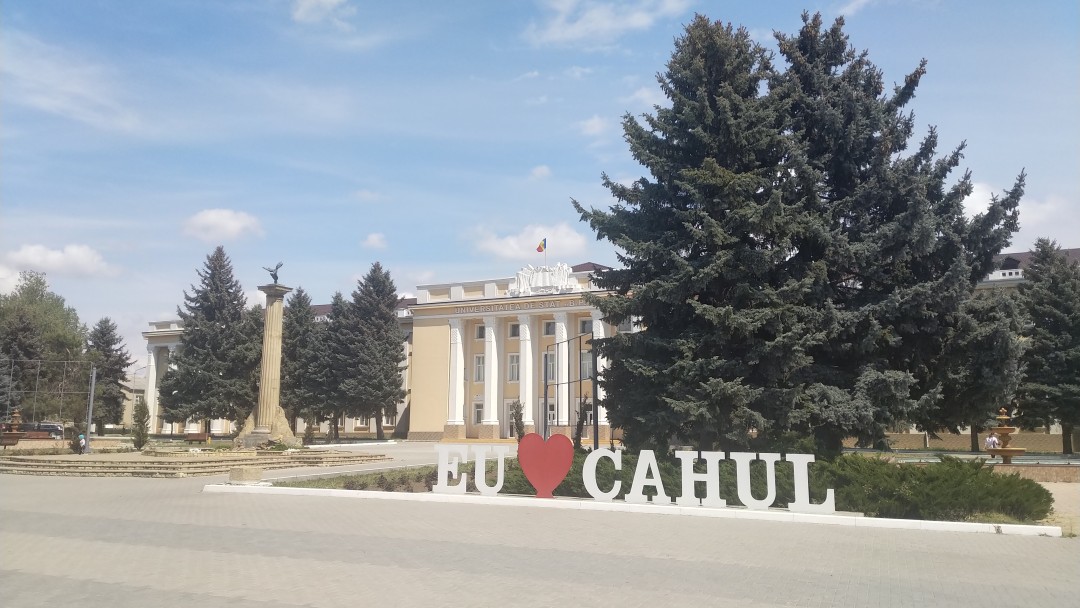News from 2022-03-01 / KfW Development Bank
European perspectives: Moldova turning to the West
For decades Moldova was under the influence of Russia. With KfW's support, the small state is seeking to join the European Union economically and politically.

Located on the southeastern edge of Europe, Moldova has been undergoing a serious transformation for more than ten years. The country, located between Romania and Ukraine, was a constituent republic of the Soviet Union until its collapse and was oriented towards Russia in the first years of its independence. Last but not least, Romania's admission to the European Union in 2007 fostered a pro-Western mood in Moldova, as it is closely linked to Romania through history, culture, language and economy.
In 2014, the EU and Moldova concluded an association agreement, followed two years later by the DCFTA free trade agreement. The Federal Ministry for Economic Cooperation and Development (BMZ) set up the "Transformation Partnerships" model. Seven states in the EU's neighbourhood are supported by the Federal Government and KfW under this model. Moldova, which with its 3.3 million inhabitants is about the size of Berlin, is one of the smaller partners in the circle of Albania, Bosnia and Herzegovina, Georgia, Kosovo, Serbia and Ukraine.
Moldovan Finance Minister Dumitru Budianschi emphasises the "very positive effects" of the DCFTA for the Moldovan economy: Exports to the EU increased by 61 percent in the six years before the Corona outbreak, the trade deficit with the EU narrowed sharply, almost 70 percent of direct investments in the country come from European Union countries.
Germany plays a special role in this process. After Romania, it is now Moldova's most important trading partner among the EU member states. Since Moldova's independence in 1991, Germany has invested 150 million euros in technical and financial cooperation with Moldova.
But the country, located near the Black Sea but without access to it, is not only small, it is also very poor. A good third of the workforce works in agriculture. One million people have left their homeland for jobs abroad. Their remittances account for 15 percent of the gross national product.
Improving the quality of life in the country is the main goal of the "Moldova 2030" strategy, according to Sergiu Gutu, head of the KfW office in the capital Chisinau. However, eradicating poverty is not just a question of money, says Gutu, but also means "equal and unrestricted access to public services". The "Social Infrastructure and Energy Efficiency" project, commissioned by the BMZ and funded by KfW with 12 million euros, has improved the infrastructure for 400,000 people in areas as diverse as childcare, energy supply or road construction. The project has been so successful that an additional eight million euros will be provided by KfW for further municipalities from 2022.
"One of our most urgent tasks is to create jobs," says Nicolae Dandis, mayor of Cahul in the south-east of the country, near the border with Romania. This is the only way to stop the migration process. In the city with its 40,000 inhabitants, Dandis reports, the improvement of the road network and waste disposal, but also the promotion of IT start-ups have been at the forefront of the aid provided by the EU and KfW. In the current year, the focus will be on expanding the sewerage system and wastewater treatment, a task that KfW is co-financing with 23.5 million euros on behalf of the BMZ.
The EU4MOLDOVA programme financed by the EU comprises around 1,000 projects. The range is enormous. Fighting the Corona pandemic, advancing digitalisation, promoting gender equality, strengthening civil society are just some of the topics. 30 million euros from EU4MOLDOVA alone have gone to Cahul. The city, which has barely ten percent of the population of the capital Chisinau, was also able to land so many projects because "the motivation of the citizens is high and the city hall works transparently" (Dandis). In 2020, the local administration of Cahul was named the most transparent in the country.
Bribery is still a plague in Moldova. The country ranks only 115th in the world on Transparency International's latest corruption index, and does worse than the BMZ's other transition partners with the exception of Ukraine. Finance Minister Budianschi also attributes the country's annual growth rate of barely three percent to "high corruption" and "serious problems in the judicial system", saying that it does not match the country's potential. However, this can hardly be changed overnight. For the reform efforts to find acceptance and unfold their benefits, a learning process is needed in society. Not least, the freedom of the media and the ability to prevent manipulation and fake news play a role in this. For Minister Budianschi, the fact that Europe also inspires hope in this respect is shown by the significant increase in travel with Moldova since the introduction of visa-free travel and the growing number of young people studying in the EU. New ideas and visions for a better future will also take hold with them.

Share page
To share the content of this page with your network, click on one of the icons below.
Note on data protection: When you share content, your personal data is transferred to the selected network.
Data protection
Alternatively, you can also copy the short link: https://www.kfw-entwicklungsbank.de/s/enzBWrMC.Cp-A
Copy link Link copied